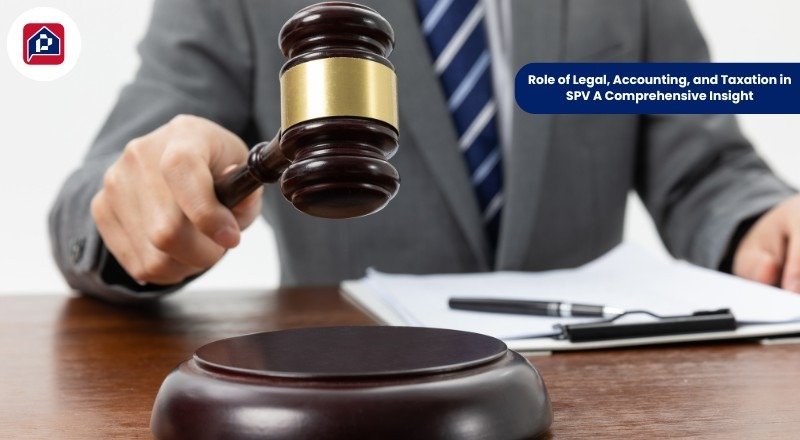Role of Legal, Accounting, and Taxation in SPV: A Complete Insight

SPV is a strategic tool in property investment, development and project finance. While its structure provides a huge deal of financial and operational flexibility, knowing the role of legal, accounting, and taxation in SPV would actually be needed in order to maximise efficiency and ensure complete compliance. The following article reflects these important roles, hence giving a broad outline of their impact.
Legal Framework: Setting the Foundation for SPVs
SPV’s legal function involves keeping the vehicle rightfully structured and observing all the applicable regulations. Setting up an SPV is a well-detailed legal affair in regard to its establishment as a registered separate legal entity, and the articles of association shall be made accordingly to suit the purpose.
It is also a very valid reason for asset protection and insulating the holding company from liabilities. For example, the SPV deals with contract agreements that are present with third parties, but such risk would be contained within project-specific deals. Moreover, the role of legal, accounting, and taxation in SPV during the drafting of agreements, procurement of funds, and dispute management of SPV studies ensures that the company stays well within the legal bounds of the law.
Besides, expert legal consultation becomes indispensable in complicated transactions, such as cross-border investments or joint ventures, where the regulations may considerably differ between jurisdictions.
Accounting: The Backbone of Financial Clarity
Accounting is thus the backbone in the management of SPVs through the presentation of financial results that are both accurate and transparent. An SPV normally requires a separate bookkeeping practice since the company setup is independent, to maintain accountability by avoiding the commingling of funds.
It, therefore, means accountants can prepare financial statements, monitor cash flows, and revenues attributable to the SPV. The accountants will also ensure that reporting is made in conformity with financial reporting standards, especially if the SPV engages in any regulated activities.
The role of legal, accounting, and taxation in SPV also comes into play through periodic audits, which help in enhancing investor confidence and maintaining credibility. The accountants monitor the expenses, revenue streams through rental income and project-specific costs in order to maintain profitability for the property or real estate SPVs.
Taxation: Ensuring Efficiency and Compliance
Understanding taxation is key to the effective working of the SPV. Tax planning strategies allow SPVs to structure their entity in an optimal manner while making sure to minimise liabilities. The role of legal, accounting, and taxation in SPV, thus ensures that entities benefit from favourable tax treatments where it is applicable.
SPVs are sometimes used, for instance, to carve out income streams so that companies can access lower levels of taxation. Tax-efficient structuring means that retained profits in the SPV take advantage of the lower corporation tax rates instead of higher personal income tax rates. In addition, good tax management also includes ways such issues as VAT compliance and international tax treaties are dealt with when SPVs undertake cross-border transactions.
Expert tax advisors will also help in the mazes of taxation to enable one to fully utilise deductions, allowances, and credits. Failure to comply with these obligations often leads to severe penalties; hence, professional advice becomes important.
Integration of Roles: A Holistic Approach
The role of legal, accounting, and taxation in SPV is, in fact, interconnected to each other instead of being separate and isolated. These areas are supposed to interact in such a way that the SPV operates efficiently, does not violate any rules and regulations, and meets the planned financial results. For instance, while accountants keep financial records, tax consultants take those records further by developing strategies that minimise liability. Equally important, lawyers ensure that the SPV’s contractual arrangements are consistent with its taxation strategy and financial objectives.
SPVs bring these roles together with a view to accessing major benefits, from asset protection right through to enhancement of profitability in a compliant manner with regulatory frameworks.
Conclusion
The role of legal, accounting, and taxation in SPV is considered indispensable in ensuring a successful operation. Whether you are a property investor, developer or project manager, understanding how these respective aspects relate to one another can protect your investment while simultaneously assuring efficiency in operation. With the power of expertise in the area, SPVs can achieve their potential to be a strong vehicle for financial structuring and strategic growth.
Property SPV
Property SPV is a trusted platform dedicated to helping UK property investors streamline their journey by incorporating properties into Special Purpose Vehicle (SPV) companies. Whether you’re an experienced investor or just starting out, our mission is to simplify the complexities of SPV formation while ensuring you unlock valuable tax advantages and other benefits.